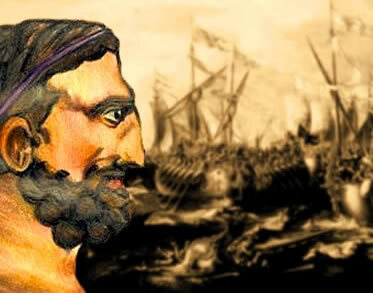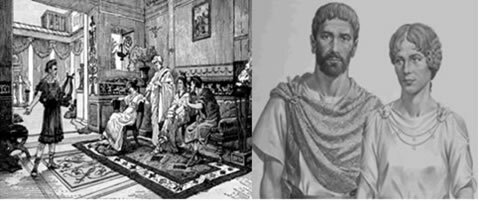After having their forces cut down by the Romans, the leaders of the Carthaginian empire decided to reinforce their military contingent by promoting the exploitation of mines in the Iberian Peninsula. Concerned about an implacable military reaction from the Carthaginians, the Romans tried to send a diplomatic mission that was to demand the limitation of Carthaginian influence in that region. Through Carthage's denial, the Romans were already ready for battle.
After the death of Amilcar Barca, his son Hannibal was responsible for controlling the Carthaginian armies. For many of those combatants, according to the account of historian Tito Lívio, the image of Aníbal Barca inspired soldiers because of his strong physical resemblance to his father. First, the new Carthaginian general promoted the invasion of the Spanish city of Sagunto. Taking advantage of the action, the Romans declared war against the Carthaginian expansionist project in the Iberian region.
Being eager for a rematch, Hannibal Barca quickly organized his armies to cross the Alps. With 50,000 infantry soldiers, 38 elephants and 9,000 horsemen, the Carthaginian forces crossed the Alps until they reached the Po valley in the northern portion of Italian territory. Despite the enormous losses suffered by the offensive action, the arrival of the enemy in the territory was able to surprise the most experienced Roman military leaders.
With the support of Macedonian and Greek troops, the Carthaginians achieved their first great victory against Rome at the Battle of Canas, which broke out in 216 BC. Ç. Soon after, the Romans decided to stifle the advance of Carthage promoting a great sack to all Italian cities that made some kind of military alliance with the Carthaginians. In parallel, Rome sent troops to try to control all the regions that provided weapons, soldiers and supplies to their enemies.
Despite early successes against the Romans, the Carthaginians were unable to continue in this war without making use of large weapons that could be transported by the sea. This obstacle, explained by the surveillance of the Roman squadrons, meant that Hannibal could not reach the city of Rome with a real chance of victory. Thus, the Romans began to win smaller battles that pushed the forces of Carthage to the region of Calabria, southern Italy.
With the passing of more than a decade, Aníbal was forced to withdraw his troops back to Carthage, in 204 BC. Ç.. In this way, the Roman general Scipio Africanus had already crossed the Mediterranean with the aim of annihilating any possibility of reaction from his enemies. No longer able to reverse the gradual defeat designed by the Romans, Hannibal's battered troops were finally annihilated in the Battle of Zama, in 202 BC. Ç..
The following year, the Carthaginians signed a peace treaty in which they ceded the Spanish territories to Rome and paid an indemnity of 10,000 gold talents. Furthermore, by this same agreement, the Carthaginians undertook to hand over their fleet to the Romans, they could not declare war without the authorization of Rome, nor to promote any kind of retaliation against the African kingdom of Numidia, which had helped the Romans.
After the end of the confrontation, the Romans ordered the pursuit of General Hannibal Barca. Such action would have as main objective to prevent the famous military could become the main political leader of Carthage. However, thanks to the help of Scipio, who admired him despite the political quarrels, he managed to lose the Roman troops who pursued him. In 183 BC a., Aníbal was found by its enemies. However, the legendary warrior preferred to attempt on his own life.
Do not stop now... There's more after the advertising ;)
By Rainer Sousa
Graduated in History
Would you like to reference this text in a school or academic work? Look:
SOUSA, Rainer Gonçalves. "Second Punic War"; Brazil School. Available in: https://brasilescola.uol.com.br/guerras/segunda-guerra-punica.htm. Accessed on June 28, 2021.
wars

First Punic War, Punic Wars, Ancient History, Ancient Rome, Roman territorial expansion, Hamilcar Barca, Battle of Mylae, Carthage, Carthaginians, Sicily, Corsica, Sardinia, Spain.


